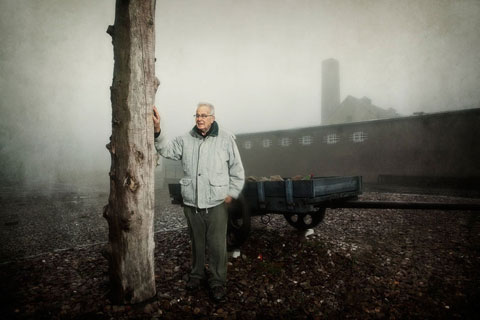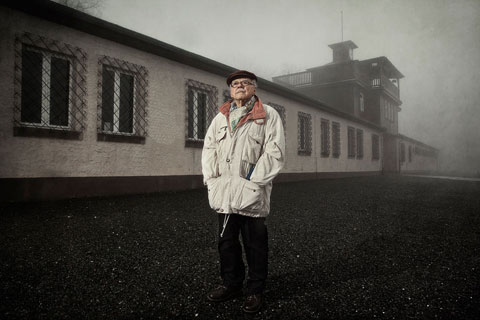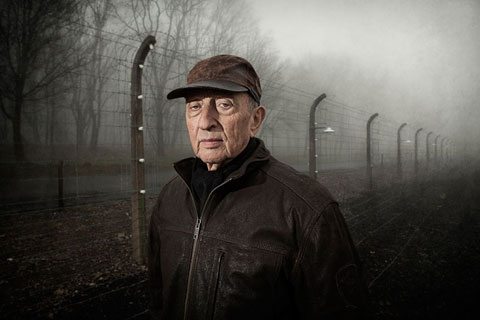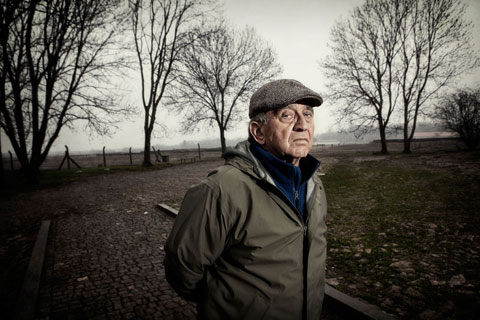About the Film
Naftali-Duro Furst

Naftali-Duro Furst was born to Artur and Margit Furst, in Bratislava, Czechoslovakia in 1932. He and his older brother, Shmuel, enjoyed an idyllic childhood until the Nazi annexation of Czechoslovakia in 1938. Forced to leave Bratislava as all Jews were, Naftali and his family hid in various towns before moving to Nove Mesto, where they had relatives.
In 1942, Naftali and his family were deported to the Sered concentration camp in Slovkia. They were held in Sered until 1944, when Slovakia joined the anti-Nazi uprising that began as Soviet troops pushed their way westward. The Fursts returned to their ancestral hometown of Piešťany, from where they were eventually captured by the Nazis and returned to Sered.
In November 1944, Naftali and his family were deported to Auschwitz-Birkenau and in January 1945, Naftali and Shmuel were taken on the infamous “Death March” to Buchenwald, where they were both put in the Block 66 of the “Little Camp.” While in Buchenwald, Naftali contracted pneumonia and after a brief stay in the infirmary, was housed in the camp’s whorehouse, from where he was liberated by the Allies in 1945.
Naftali, his parents and his brother all miraculously survived the war – the only Jewish family in Slovakia to return intact from the camps. After the war, the family immigrated to Israel. Naftali served in the Israel Defense Force and lived on Kibbutz Ma’anit. He later worked as a photographer, a driving instructor and a factory manager prior to his retirement.
Naftali lives with his life partner, Tova Wagman. He is the father of the artist Ronit Furst and has four grandchildren.
> back to top
Pavel Kohn

Pavel Kohn was born in Prague, Czechoslovakia in 1929. After the Nazis annexed Czechoslovakia, he was first prohibited from attending school and later deported to Theresienstadt with his entire family. His father died in Theresienstadt and his mother in Birkenau. In 1944, Pavel and his brother were transferred to Birkenau and then to Blechhammer, where his brother died in the gas chamber.
In January 1945, Pavel was sent on the “Death March” from Birkenau to Gross Rosen, from there he was transferred in an open coal car to the Buchenwald concentration camp, where he was housed in Block 66. After liberation Pavel returned to Prague to discover that his entire family, save for one cousin, was murdered by the Nazis.
Following his studies in dramatics and theater history, Pavel was a dramatist at the Theater in Carlsbad/Karlovy Vary, where he worked for five years until being fired for political reasons. He was banned from his profession for seven years, during which time he worked as a theater critic, reporter, writer and editor.
In August 1967, he escaped Czechoslovakia to West Germany, where he worked for over twenty years at Radio Free Europe as a producer. Since 1990, he has been retired and living in Germany.
Pavel is married to Rut and has three children, seven grandchildren and a great- granddaughter.
> back to top
Israel-Laszlo Lazar

Israel-Laszlo Lazar was born in 1930 in Oradea-Mare, Romania to Jenö-Shlomo and Rozalia-Shoshana Lazar. In 1940, his hometown of Oradea was incorporated into Hungary, setting the stage for the eventual annihilation of the town’s Jews when Germany occupied Hungary in 1944. In 1944, Israel and his family were deported to the concentration camps Auschwitz and Buchenwald.
After four days in Buchenwald, on June 26, 1944, Israel was deported to the Rehmsdorf labor camp, where he worked in a lignite factory. After surviving three bombardments of Rehmsdorf by allied troops, Israel was sent to the Buchenwald concentration camp on February 6, 1945. At Buchenwald, he was housed in the “Little Camp,” first in Block 59 and later in Block 66.
Following the end of the war, Israel returned to Oreda, to find that only two other members of his extended family had survived the Holocaust. From 1946-51, he worked in a garage and a machine factory while preparing to immigrate to Israel, which he did on January 21, 1951.
In 1952, Israel began his military service as a mechanic. He served in this capacity until 1983, when he retired from the army and worked as a mechanic for several different companies until his retirement in 1995.
In 1988, Israel began working on his autobiography as a way to memorialize the members of his family who perished in the Holocaust. He filmed a documentary about his life from 2005-2007 and volunteers as a lecturer on the Holocaust in schools, museums and libraries.
Israel is married to Esther, has four children and four grandchildren. He lives in Kiryat Motzkin, Israel.
“Live, but don’t forget.”
> back to top
Alex Moskovic

Alex Moskovic was born in Sobrance, Czechoslovakia in 1931. In the Spring of 1944, when he was 13 years old, Alex and his family were packed into cattle cars and deported to Auschwitz - Birkenau where he was separated from his parents and siblings.
In the winter of 1945, as the Soviet Army advanced on Birkenau, Alex, along with thousands of other inmates, was taken on the “Death March” to Gleiwitz, Poland. In Gleiwitz, Alex was reunited with his father Josef and brother Zoltan. At the end of January 1945, Alex, his father, brother and the remaining survivors were transported in open coal cars to the Buchenwald Concentration Camp in Germany.
Alex was liberated by the U.S. Army on April 11th 1945 in Buchenwald. He was the only survivor of a large immediate and extended family of 41.
In July 1946, Alex immigrated to the United States and eventually went to work at ABC Sports (Wide World of Sports, Olympics) as a post production editor for 30 years. He earned 10 Emmy Awards for his work.
Today, Alex appears as a guest speaker at schools in South Florida and is an active member on many committees involved with Holocaust and survivor issues. On April 27, 2007 Alex was awarded the Gold Good Citizenship Medal from the St. Lucie Chapter of the Sons of the American Revolution for his outstanding contribution to the education of our nation’s youth.
Alex is married to Jo and has two sons and four grandchildren.
> back to top
Rob Cohen, Writer. Director
Rob has traveled the world finding the stories that matter. As a documentarian he has worked for CBS, Discovery, PBS and History. He has directed several films of Jewish interest and has received numerous awards.
He has a film degree from Yale University.
> back to top
Steven Moskovic, Executive Producer
Steven Moskovic is an award winner producer, director and director of photography with over 25 years of production experience.
In 2006, he produced and was the director of photography for the documentary film “The Diary of Immaculee;” he also produced the feature film, Homeland in 2008. Steve was the director on the independent feature, “One Angry Man,” which he also produced. He is currently producing the documentary film “The Soprano State,” and directing the Independent Feature, “In A Pickle.”
Steve’s father, Alex, is a survivor of the Buchenwald concentration camp and it is in his honor that Steve has decided to make this film.
> back to top
Brad Rothschild, Producer
Brad Rothschild is a producer and writer with both a creative and a business background. He received a Masters in International Affairs and an MBA, both from Columbia University. From 1995-1997, he served as the Speechwriter and Director of Communications for the Mission of Israel to the United Nations.
Brad wrote and produced the award-winning independent film Homeland.
> back to top
Paul Turlick, Producer
Paul Turlick has been involved in all aspects of video production for over 22 years ranging from corporate to industrial, documentary to independent features and a wide array of broadcast productions. Over the past 15 years, he has focused on producing and post-production supervision with an emphasis on documentary filmmaking.
Paul has a BS in Television and Film Production from Syracuse University and a Master’s Degree in Media Studies from the New School for Social Research.
> back to top
Martin P. Pohl, Producer
Martin Pohl was born and raised in Mainz, Germany and moved to the United States in where he established P. POHL PRODUCTIONS in 1995.
P. POHL PRODUCTIONS offers clients professional, high quality films, commercial shoots and stage shows using locations in the New York City area, the United States, and Europe. P. Pohl Productions is a full-service business with over twenty years of experience in producing and directing television spots, feature films and corporate videos and events for his international clients in the Luxury Packaged Goods Industry as well as the Luxury Automobile and Financial Industries and also Feature Films.
> back to top
Kenneth Waltzer, Historian
Kenneth Waltzer is professor of history and director of the Jewish Studies Program at Michigan State University. He has completed researching and is finishing a book tentatively titled Telling the Story: The Rescue of Children and Youth at Buchenwald; he is also preparing a second book tentatively called Buchenwald Stories: Children in the Nazi Concentration Camps.
Professor Waltzer has been in the news several times connected with his research on Buchenwald, including his discovery of the rescuer of Israel Meir Lau (Lulek), the eight year old boy who later became Chief Ashkenazi Rabbi of Israel and is today head of Yad Vashem, and his outing of a Holocaust memoir fraud, Angel at the Fence, by survivor Herman Rosenblat, whose story appeared first on the Oprah Winfrey Show. Professor Waltzer has interviewed and compiled information on over 150 former Buchenwald boys who live around the globe, primarily in the U.S., Canada, Israel, Australia, England, and France. He is a major source for the history of child rescue and child experience in Buchenwald and of the story of the kinderblock 66.
ABOUT THE FILM
Characters
Production Personnel
DONATE
The International Raoul Wallenberg Foundation ("IRWF") has made Kinderblock 66: Return to Buchenwald one of its key projects, and will be accepting tax-deductible contributions earmarked for its production. We hope that you will consider making a donation to the IRWF. Click here to find out how.
CONTACT
Reach us via email at steve@bigfootnyc.com.